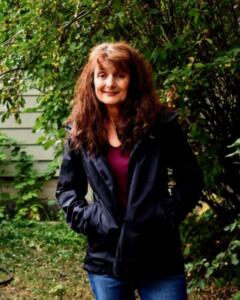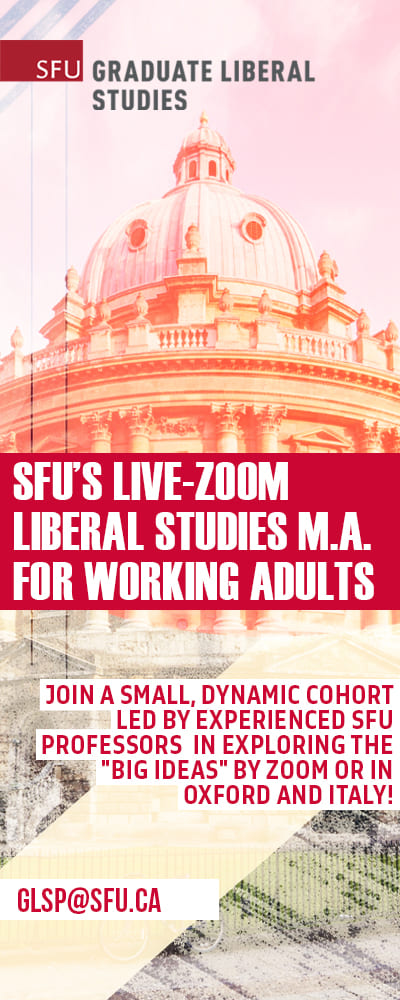Roots, ‘praise portals,’ koans, and the Resurrection
Consider
by Susan McCaslin
Thornhill: Aeolus House, 2023
$20.00 / 9781987872545
Reviewed by gillian harding-russell
*

As tempered by her contemporary consciousness, Susan McCaslin in Consider searches for a common spirituality among biblical and sacred writings.
The collection is divided into five sections: Cosmic Egg, Apocrypha, Consider, Cracking the Jesus Koans, and A Suite on Robin Blaser’s Libretto, The Last Supper. Although deeply immersed in religious cultures ranging from Christianity to Islam, with facets of paganism, etc., McCaslin ascribes to none in particular but finds echoes and correspondences between faiths. She presents her insights in poems at once erudite and lively, and characterized by inventiveness and wordplay.
As Fort Langley’s McCaslin (Sentient Stones) tells the reader in a note at the beginning of the collection, the title Consider draws meaning from its etymological origins as a bringing together of stars (“con” and “sidereal’).
I’m particularly enamoured by the cover design with Tracy Tarling’s painting, in which a world tree is rooted with a metamorphosing butterfly from rich earth-brown roots and against a misty (and mystical) pink sky.
The initial suite of 33 pieces, Cosmic Egg, hinges on the origins of Christianity, along with echoes from other religions. Here the poems are written in a centred ode-like format with incremental lines characterized by lacunae (translated as “lakes” in Latin) or breath-takes between phrases.
From the historic caves where excavations turned up “[f]ragments on vellum,” “redactions,” and “restoried stories” from sacred texts, the poems move through the speaker’s childhood perception of Jesus in Sunday school (“singing Jesus loves me” in “The Good Shepherd”) to a more worldly and cynical view of the religion’s association, with “US colonialism racism world poverty” in “Wake Up Calls,” and then, more hopefully, in the pop-star figure of Jesus Christ, Superstar in “A Tilting Boat.”
“The Camel in the Room” introduces the apocryphal suggestion that Mary Magdalene may not have been a prostitute but instead Jesus’s wife, and that they together had a child. This knowledge may have been censored by a patriarchal Roman establishment, and a Catholic faith requiring a divinely conceived and celibate Christ.
One of my favourite poems in Cosmic Egg is “Birds of Clay,” in which Jesus is presented in the Quran as shaping birds from clay and breathing life into them. The speaker recalls her dream experience while adding leaves to a “too-small oak table” for a dinner party: “I find underneath two goldfinches/unquivering silent likely dead gather them in my hands.” The speaker then carries them to the garden, and releases them to open air where they “fly away,” and feels in having brought them outside that they have come to new life.

In “Apocrypha,” McCaslin also uses a centre justification with uneven ecstatic verses that carry a sense of the speaker’s insights and revelations. One of the most gnomic and striking as what I see as an example of a spoken-word poem comes in “Open Doors,” in which the poet is seen as the “door” for the “Logos” or word that informs the world:
We are the doors
through which wild Logos dances
praise portals
lion lamb sheepgoats vinebranches
manifesting dissolving gone
In a variation of the hieratic vessel for inspiration, McCaslin’s door becomes a “praise portal” for insight. From oxymoronic “lionlamb,” “sheepgoats,” and other word coinages, we see how opposites may be reconciled through the “burning show” that is life and “all we have till we let it go.”
To contemplate the wonders of nature is to contemplate the majesty of creation, and in the title section Consider, McCaslin focuses on creatures close to her heart. With each poem in the sequence beginning with an anaphora-like “Consider,” the sequence may be seen as one long poem.
In “Consider the Sandhill Crane,” she meditates on the beauty of those prairie birds “trumpeting courting/crying from coiled trachea/flying between worlds” and, with a touch of anthropomorphizing humour that suggests lovers, “red-masked” and “eyeing each other coyly.”
In “Consider the Coast Mole,” the poet talks with tongue-in-cheek amazement at the creature that – perhaps like the poet faced with world noise– “quietly invisibly/pl[ies] her craft” while enduring “the lawnmower’s racket.”
Central to the section, and to the collectionas a whole, is the poem “Consider the World Tree” which brings us back to the butterfly/tree metamorphosis of the cover design. Following an environmental theme, the “Axial tree,” the Nordic Yggasdril that nourishes nations, is “toppled,” “displacing marbled murrelet” and “spotted owl,” perhaps never to be “sighted” or, as McCaslin cannot resist the pun, “cited” again:
The pant and cant of greed
sniffs to the root of the Manna Tree, Tree of Life –
stripping her floors of mottled moss
till there is nowhere anywhere
to lay our heads
breathe emerald song
lie down in green valleys
or read the Smaragdine Tablet of the air
In contrast to the centre justification used in “Cosmic Egg,” most of the poems in Consider adopt a left justification grounded in the left brain-hemisphere and the specific as emblematic of the universal perhaps.
In Cracking the Jesus Koans, McCaslin moves from historical overview and the celebratory, to the daily conundrums of living. As becomes one of her signature styles, the poet introduces wordplay reminiscent of rap poetry and nonsense verse, both catchy and idiotic, in the opening piece: “cracking cosmic eggs/ making wise cracks/ can open cracks,” and “cracks us up” to let in the light of insight.
My favourite poem in this section is introduced by an excerpt from the Book of Mary Magdalene in which the speaker remarks on her leaving one world “with the aid of another” that obliterates “the [original] design.” Here McCaslin uses a snowflake image that “dissolves in water” to become “the lake’s eye” and a disembodied consciousness “gazing skyward.” As so often in McCaslin’s work, themes come alive with a vibrant iconic imagery derived from nature.
A Suite on Robin Blaser’s Libretto for The Last Supper McCaslin mulls the betrayal of Jesus and the Crucifixion from non-traditional (pagan and modern) angles, suggesting that the holy ghost may be a “she-ghost” and female, and puts forward the recent scholarly theory that Judas may not have wished to betray Jesus for thirty pieces of silver but instead that he was so certain that Jesus was the Messiah that he knew his Christ would resurrect from the cross.
Echoing earlier arguments in the “Cosmic Egg,” “Aramaic Jesus laments/the institutional-religion racket” “that colonizes and kills,” and instead the poet looks to nature for spiritual renewal: a “kind of forest-bathing” with “paths of water – words of wind.” Here, also, the verse is inspired by the sacred and holy as expressed in cadences marked by alliteration and wordplay.
Altogether, McCaslin’s Consider is a uniquely conceived collection of related sequences that touches on a subject mostly absent from contemporary Western thought while searching for spirituality at the centre of human faith–even as many institutional religious bodies have become contaminated by the worst in human nature.
[Ed: readers interested in obtaining a copy can contact the publisher here.]
*

A poet, editor, and reviewer, gillian harding-russell lives on Treaty 4 territory. Her most recent collections include In Another Air (Radiant Press, 2018) and Uninterrupted (Ekstasis Editions, 2020). Both full-length poetry collections were shortlisted for Saskatchewan Book Awards. In 2016, a poem sequence Making Sense won first prize in Exile’s Gwendolyn MacEwen Chapbook Award. Also, a chapbook, Megrim was released by The Alfred Gustav Press in 2021. [Editor’s note: gillian harding-russell recently wrote about collections by Diana Hayes, Susan McCaslin, Marlene Grand Maître, and Ian Thomas in BCR.]
*
The British Columbia Review
Interim Editors, 2023-25: Trevor Marc Hughes (non-fiction), Brett Josef Grubisic (fiction)
Publisher: Richard Mackie
Formerly The Ormsby Review, The British Columbia Review is an online book review and journal service for BC writers and readers. The Advisory Board now consists of Jean Barman, Wade Davis, Robin Fisher, Barry Gough, Hugh Johnston, Kathy Mezei, Patricia Roy, Maria Tippett, and Graeme Wynn. Provincial Government Patron (since September 2018): Creative BC. Honorary Patron: Yosef Wosk. Scholarly Patron: SFU Graduate Liberal Studies. The British Columbia Review was founded in 2016 by Richard Mackie and Alan Twigg.
“Only connect.” – E.M. Forster






























